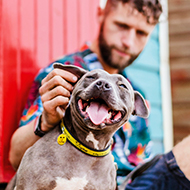
Public asked to share understanding of dogs' body language and their reactions to it.
Dogs Trust is encouraging the UK public to take part in a new survey, launched on Wednesday 5 May, which aims to improve understanding of dog behaviour.
The survey – Public Perceptions of Dog Behaviour and Emotion – will explore how people interpret dogs’ body language, as well as the emotions they associate with it, and how they might respond to it. This is will inform Dogs Trusts' strategy moving forward, helping the charity to understand which aspects of dog welfare and public safety it needs to promote.
It takes 20 minutes to complete the survey and it will be open for the next four weeks. Participants will be asked to watch a series of videos of dogs and score the behaviours that they see, as well as identify what emotion the dog is feeling. They will also be asked questions about their experiences with dogs and their lifestyle.
Dr Lauren Samet, canine behaviour research officer, said: “With dogs occupying such a big place in society it’s vital we all understand them as well as possible.
“Being able to spot when a dog is anxious, worried or even frightened, so that we can respond to those emotions in the right way, means we can all live happier lives together.
“Whether you own a dog or not, your views are equally important. Men are also really under-represented in surveys like this so we’re making a special appeal to them to take part.”
The survey can be found at https://www.smartsurvey.co.uk/s/DogBehaviourEmotion/
Image (c) Dogs Trust.



 The Veterinary Medicines Directorate (VMD) is inviting applications from veterinary students to attend a one-week extramural studies (EMS) placement in July 2026.
The Veterinary Medicines Directorate (VMD) is inviting applications from veterinary students to attend a one-week extramural studies (EMS) placement in July 2026.